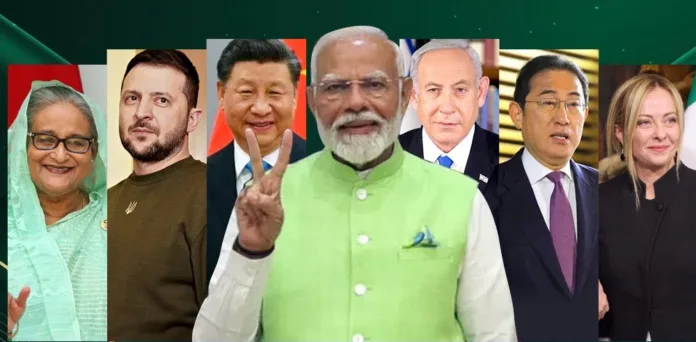Bangladesh PM Sheikh Hasina, Sri Lankan President Ranil Wickremesinghe, and Nepal PM Pushpa Kamal Dahal Prachanda are among the confirmed attendees for PM Modi’s oath-taking ceremony
Prime Minister-designate Narendra Modi is set to take the oath of office on Sunday in New Delhi, with a notable presence of foreign dignitaries, including leaders from neighbouring countries. The event is anticipated to strengthen diplomatic ties and underline India’s commitment to its ‘Neighbourhood First’ policy.
Among the prominent attendees will be Bangladesh PM Sheikh Hasina, who is scheduled to depart from Dhaka today at 11 am for Delhi. Additionally, Sri Lankan President Ranil Wickremesinghe and Nepal PM Pushpa Kamal Dahal Prachanda have confirmed their participation in the ceremony.
The event is also expected to witness the presence of leaders from Bhutan, Mauritius, Seychelles, and possibly Maldives President Mohamed Muizzu. Muizzu’s attendance holds significance, considering the strained relations between India and Maldives following his apparent alignment with China and calls for the withdrawal of Indian military personnel from the country.
Muizzu’s predecessors have previously attended Modi’s oath ceremonies, signalling the potential for diplomatic reconciliation between the two nations. The presence of these leaders underscores India’s commitment to fostering regional cooperation and strengthening ties with its neighbours.
The invitation extended to these leaders aligns with India’s ‘Neighbourhood First’ policy, emphasizing the importance of building strong partnerships with neighbouring countries. The presence of key stakeholders from the region highlights the shared vision for peace, stability, and prosperity in South Asia.
Analysis:
Political Impact: The attendance of neighbouring leaders at Modi’s swearing-in ceremony reflects the diplomatic significance of the event and its potential to shape regional dynamics. It signifies India’s proactive engagement with its neighbours and its commitment to fostering mutual trust and cooperation in the region.
Social Reflection: The participation of leaders from neighbouring countries highlights the interconnectedness of South Asian nations and the shared aspirations for progress and development. It underscores the importance of dialogue and collaboration in addressing common challenges and advancing collective interests.
Psychological Aspect: The presence of foreign dignitaries at the ceremony may instill a sense of pride and confidence among Indian citizens, reaffirming the country’s stature on the global stage. It can also serve as a source of optimism for future collaborations and partnerships aimed at promoting regional stability and prosperity.
Sociological Angle: The event provides an opportunity to strengthen people-to-people ties and cultural exchanges between India and its neighbours. It fosters a sense of community and solidarity among South Asian nations, transcending political boundaries and promoting understanding and goodwill among diverse populations.
Fashion Culture: While not directly related to fashion trends, the ceremony may showcase traditional attire and cultural expressions from different countries, reflecting the rich diversity of the region. It presents an occasion for cultural diplomacy and the celebration of shared heritage and values.
